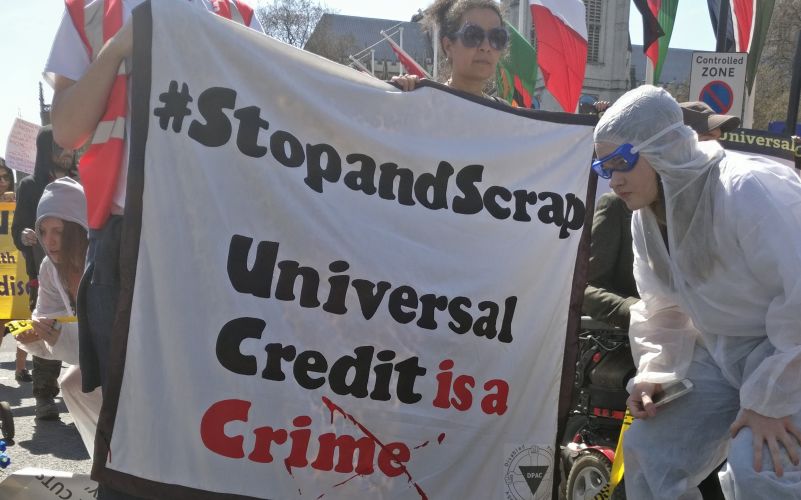The government’s own social security advisers have called for “urgent” action to stop jobcentre staff forcing claimants of universal credit (UC) to take medication or attend medical appointments in return for receiving their benefits.
The social security advisory committee (SSAC) included the “particularly concerning finding” in a new report about the effectiveness of the government’s universal credit claimant commitment.
The claimant commitment is a set of “individually tailored requirements” that a benefit claimant agrees to meet in return for UC payments, and it can include a pledge to carry out a certain number of hours looking for and applying for jobs, networking, updating a CV, or attending training.
It is supposed to be DWP policy that only work-related activities are included in the claimant commitment, but SSAC said it was “clear that this is not happening in all cases”.
The report says some of the random sample of claimant commitments the committee saw included activities relating to the claimant’s management or treatment of a health condition, including commitments “outlining that medical appointments should be attended, or that medication should be taken”.
The report says claimants are left confused as to whether medical-related activities in their claimant commitment are mandatory or voluntary.
The committee says DWP should “urgently act to ensure requirements placed on claimant commitments are just work-related and do not inappropriately include requirements related to a claimant’s health or medicine”, which “can cause real harm to claimants”.
The SSAC report was published as the prime minister appointed Therese Coffey – who was previously a minister in the Department for Environment, Food and Rural Affairs – to be the new work and pensions secretary, following Amber Rudd’s resignation over the government’s Brexit policy.
Coffey becomes the seventh work and pensions secretary in less than four years.
SSAC says in this week’s report that claimant commitments are often not tailored effectively to the individual, with claimants with physical and mental health impairments “less likely than other claimants to feel that their commitment reflected their circumstances”.
Some claimants with mental health problems find interacting with work coaches very stressful, says the committee, with one claimant saying that they just accept the commitment to enable them to “get away as quickly as possible”.
The committee also says that some people with learning difficulties may struggle to understand their claimant commitment and what they have agreed to do.
Work coaches are legally required to make reasonable adjustments for disabled claimants under the Equality Act, which could include varying the type of work they should look for and accept.
The committee says the claimant commitment is an “intrinsic” part of universal credit.
But it raises concerns in the report about how the commitment is being used and says there is a “real risk” that it could be having a “detrimental impact” on some claimants, particularly those in vulnerable circumstances.
The committee says that its findings show that work coaches “are trying their best to develop effective commitments, in what can be very challenging circumstances”, while there are “excellent examples of work coaches defining tailored requirements for claimants, including claimants with complex circumstances”.
But the committee’s interim chair, Liz Sayce, former chief executive of Disability Rights UK, says in the report that it is impossible to identify the “true scale” of the problems with the claimant commitment because DWP does not collect the right data.
Sayce said: “The claimant commitment is a central part of the government’s approach to helping people back into work.
“But the committee’s work has shown that improvements need to be made.
“Inappropriate conditions and ineffective support risks failing some benefit claimants and their families, and in some cases may cause harm.
“Getting this policy right, all the way across the country, is essential.
“DWP needs to do more, more quickly, to ensure that happens.”
In its response to the report, DWP welcomed the committee’s work.
It said that conditionality had been “a feature of benefit entitlement in the UK since the formation of the welfare state” and that the claimant commitment was “a key part of conditionality”.
It said: “As part of the continuous development and improvement of the universal credit claimant commitment a number of improvements suggested by the committee have already been introduced.”
It said further improvements were planned for this year and next year and it would carry out “additional work” based on the committee’s findings as part of this programme.
It said it would respond to the report’s recommendations this autumn after giving them “full consideration”.
A note from the editor:
Please consider making a voluntary financial contribution to support the work of DNS and allow it to continue producing independent, carefully-researched news stories that focus on the lives and rights of disabled people and their user-led organisations.
Please do not contribute if you cannot afford to do so, and please note that DNS is not a charity. It is run and owned by disabled journalist John Pring and has been from its launch in April 2009.
Thank you for anything you can do to support the work of DNS…

 Government ignores warnings of new DWP deaths, and UN intervention, as MPs pass universal credit cuts bill
Government ignores warnings of new DWP deaths, and UN intervention, as MPs pass universal credit cuts bill Urgent letter from UN to Labour government warns: We think your cuts continue Tory attack on disability rights
Urgent letter from UN to Labour government warns: We think your cuts continue Tory attack on disability rights Race against time to secure DWP deaths evidence before parliament passes new benefit cuts bill
Race against time to secure DWP deaths evidence before parliament passes new benefit cuts bill